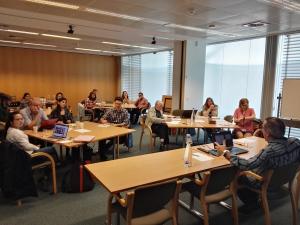You are here
- Home
- Using research to inform and shape financial inclusion
Using research to inform and shape financial inclusion
5 June 2018

A recent masterclass organised by The Open University saw Early Careers Researchers (ECRs) and PhD students in economics and geography come together with key experts in finance, to discuss the reality, challenges and changes needed to enable financial inclusion worldwide.
Financial inclusion is a hugely important topic for today. Currently, over 2.5 billion people around the world lack access to financial services. Financial services, even as simple as a bank account, enable people to safely store their money, grow their assets, purchase vital health and other insurances, and even start a business. Financial inclusion is a movement to make financial services available to all – to make such services a basic human right, no matter a person’s background, income, geographical location etc. But there are concerns whether modern financial markets, which are motivated by global opportunities for profit, can deliver the goal of social fairness, which was exemplified by exploitative lending to vulnerable households before the 2007 crisis.
The ‘Masterclass on Critical Understanding of Financial Inclusion’ took place in London and was organised by The Open University’s Innovation, Knowledge and Development (IKD) Research Centre and Open Political Economy Group (OPEG). Hosted by finance experts from the OU, Leeds and Bristol, the event was attended ECRs and PhD students from the OU, University of Leeds, Coventry University, UCL, Loughborough University, University of Bath, University of Greenwich, SOAS University of London, City University.
Jonquil Lowe, Senior Lecturer in Economics and Personal Finance at The Open University, set the scene, first looking at the differences between financial capability and financial inclusion. She then shared insight on how the concept of financial inclusion was originally based on a flawed view of markets, because financial providers have power to influence consumers, and consumers behave in a more complex way than originally assumed by the theory. Jonquil concluded by arguing that new developments in financial technology are an opportunity but also a challenge for developing financial capability, and that the macroeconomic context is important for positive outcomes.
Gary Dymski, Professor and Chair in Applied Economics at the University of Leeds, looked at the differences in how the topics of credit discrimination and financial exclusion are interpreted among academic researchers in economics and geography, and how broader economic structures and racial inequality shape these interpretations, focusing particularly on the USA. He underlined the importance of national financial regulation and of controlling capital flows, and then looked at why we may need to consider a new concept – financial citizenship (based on building inclusive, productive, non-exploitative financial systems) – to achieve financial inclusion worldwide.
Sharon Collard, Chair in Personal Finance at the University of Bristol, concluded the speaking slots by looking at how the aims, tools, and challenges of the financial inclusion and regulation policy changed over the subsequent administrations in the UK since 1997, and particularly looking at this in the context of broader government policy objectives and global economic performance. She explored what will shape policy in the future, including revived public interest in unsustainable debt (for example, celebrity support for non-profit campaigners) and unpacking what affordable credit really means.
An interactive session followed the three speakers, and participants produced a list of policy action points and points for future research, which included:
- Contextualising financial inclusion within the role of broader government policy, a need to address inequality (economic, gender, racial);
- Better borrowing conditions for small and medium enterprises;
- Understanding non-mainstream financial services;
- Changing the culture of debt (away from shaming).
Participants concluded that bringing back closer relationships between borrowers and lenders (for example, the establishment of municipal credit union), would positively impact on financial inclusion, but questioned how this would be possible in a world where the growth of financial technology makes interactions and transactions between people and banks increasingly digital/remote.
Dr Hanna Szymborska, Lecturer in Economics at The Open University, said: “Research plays a huge role in understanding the rationale and impact of financial inclusion, and informing important agenda policy worldwide, yet this is an area that is severely under-researched. We wanted to reach out to Early Careers Researchers and PhD students with this masterclass to bring our expertise together, start conversations, and look at ways we can work to inform and enable more equal access to financial services around the world. This event, and the discussions and connections to brought together, was an exciting and promising first step, and we look forward to developing this network in the future.”
The event was organised by colleagues from IKD and OPEG at The Open University, and particular thanks go to the organising committee including Dr Hanna Szymborska, Tamanna Yasmin, Dr Daniele Tori, Dr Cristina Santos, Dr Andrew Trigg and Dr Stuart Parris.
Share this page:
Monthly Archive
- March 2024 (1)
- November 2023 (1)
- February 2023 (1)
- January 2023 (1)
- November 2022 (1)
- October 2022 (1)
Contact us
To find out more about our work, or to discuss a potential project, please contact:
International Development Research Office
Faculty of Arts and Social Sciences
The Open University
Walton Hall
Milton Keynes
MK7 6AA
United Kingdom
T: +44 (0)1908 858502
E: international-development-research@open.ac.uk
.jpg)